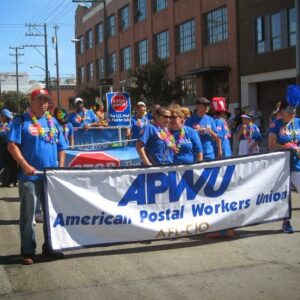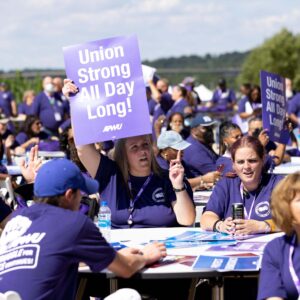September 27, 2019
APWU Workers Testify During Interest Arbitration Hearings
Struggle for New Union Contract Continues:
During the interest arbitration hearings on September 24 and 25 the APWU brought members from the workroom floor to testify to the Arbitration Board providing details about many aspects of their job including responsibilities working conditions training requirements and staffing concerns. Their testimony showed postal workers’ deep commitment to the postal mission of service to all the people of this country.
A total of 28 postal employees testified on six panels separated by craft and job type. The Clerk Craft panels were Mail Processing and Retail Clerks the Maintenance Panels were Mail Processing Equipment and Building Maintenance and MVS panels were PVS Drivers (MVOs/TTOs) and Vehicle Maintenance.
Before witnesses testified each craft director introduced their respective panels by giving an overview of responsibilities and laying out the issues their members faced in the workplace.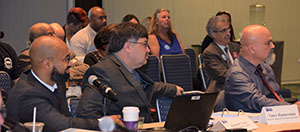
“Every member should be proud of your co-workers,” said President Mark Dimondstein. “Through their eloquent testimony it was crystal clear that postal workers are skilled public servants deeply dedicated to our jobs to the mission of the public Postal Service – and who deserve to be well-compensated and well-treated with a good union contract.”
“We are very fortunate to have such a strong union represented well by the members on the panels,” said Industrial Relations Director Vance Zimmerman who is leading the preparation and planning for the APWU’s interest arbitration case. “The workers did a superb job of explaining the complexity and diversity of our multiple jobs and the service we provide to our customers.”
Clerk Craft Panels
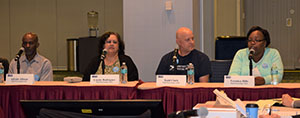 The Mail Processing panel’s testimony included information about the safety concerns and physical requirements of their jobs. They also discussed the difficulties in processing a massive amount of mail – tens of thousands of pieces per hour – and how the contents in each envelope or package are unique and trusted by customers to reach its destination.
The Mail Processing panel’s testimony included information about the safety concerns and physical requirements of their jobs. They also discussed the difficulties in processing a massive amount of mail – tens of thousands of pieces per hour – and how the contents in each envelope or package are unique and trusted by customers to reach its destination.
“90 percent of the time mail is with the clerk…and we take [our responsibility] quite seriously,” said Mail Processing Clerk Veronica Hills of the Hattiesburg MS Area Local. “Our customer is America and they trust us to get their things where they are sending them.”
During their panel Retail Clerks offered testimony that provided details about their day-to-day tasks and the skill it takes to successfully engage with customers and deliver true public service to the people that come into the post office.
“The service that we provide is not a service that you’d find at Walmart or Target,” said Stephanie Clark of the Northeast Mississippi Area Local. “These are services that are wrapped up in the mail our customers send. We are sending smiles and hugs and love.”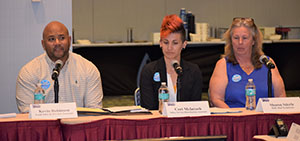
In her testimony Retail Clerk Cori McIntosh of the Missoula (MT) Local told a heartbreaking story of helping a customer who came into the post office in tears having lost her daughter and looking for a way to send ashes overseas.
“We read through the restrictions together,” McIntosh said. “I found out that this country accepted [a] small amount in grams and we worked out how much that was together.”
Maintenance Craft Panels
In their testimony Mail Processing Equipment mechanics described the complex and state-of-the-art mail sorting machines they work on every day as well as the high pressure and stress of repairing machines with time constraints. The panel emphasized how much training is necessary to do their jobs and described how mechanics must share knowledge and work together to meet difficult challenges that may arise each day.
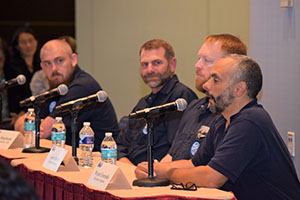 Members of the Building Maintenance Panel testified how a large amount of training and experience is needed to effectively solve different sets of problems that come up each day. Yet workers face more challenges with the job cuts in the last couple of years.
Members of the Building Maintenance Panel testified how a large amount of training and experience is needed to effectively solve different sets of problems that come up each day. Yet workers face more challenges with the job cuts in the last couple of years.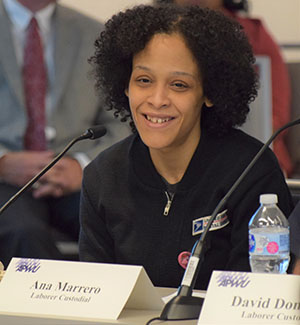
The panel also testified how important their work is when it comes to fulfilling the Postal Service’s mission.
“We are required to do the same amount of work with less people,” said Ana Marrero a Custodian from the Nation’s Capital Southern MD Area Local. “A lot of the work is physical…and [the other custodians and I] carry more of a workload…it causes a lot of stress.”
“What we are doing is a lot more than just delivering the mail. What we do is affecting our community,” said Area Maintenance Technician Parker Rauch from The Northern Virginia Area Local. “I go into a facility and I want to make it the best I can…if I make it a better environment for our employees they will be able to give better service to our customers.”
MVS Craft Panels
The two MVS Panels highlighted multiple issues that affect their work including pay subcontracting safety and a lack of training to complete difficult tasks.
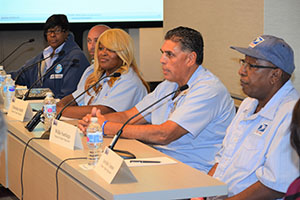 Vehicle Maintenance workers testified how difficult their work has become as they deal with new technology in vehicles without the training needed to efficiently solve problems. “When you don’t have any training to see how things work as a mechanic you can figure [things] out…but it takes longer than it needs to,” said Wade Jackson from the Baltimore Francis Stu Filbey Area Local.
Vehicle Maintenance workers testified how difficult their work has become as they deal with new technology in vehicles without the training needed to efficiently solve problems. “When you don’t have any training to see how things work as a mechanic you can figure [things] out…but it takes longer than it needs to,” said Wade Jackson from the Baltimore Francis Stu Filbey Area Local.
These problems are compounded by the Postal Service’s subcontracting of work to private companies. “We see vehicles back for a ‘no-start’ and see there is a hole in the frame. The contractor [who worked on the vehicle months before] didn’t report the hole because they wanted to get paid and not stop work.” Jackson explained.
“Holes in the frame doesn’t happen in six months,” Leo Wesolowski of Eastern Montgomery County PA Area Local agreed. “Either they aren’t skilled to see this problem or they’re ignoring them so they can get money.”
Panelists also testified about the pride they have in helping to fulfill the Postal Service’s mission each and every day. “Truck Drivers are on the front line,” said Tiwanna Rogers a Motor Vehicle Operator from the Detroit District Area Local. “We play a very big part in the Postal Service.”
“We are the beginning and the end of everything with the Postal Service,” said Mervin Gooch from the Montgomery County Area (MD) Local. “Without us the mail does not move.”
More Hearings to Come
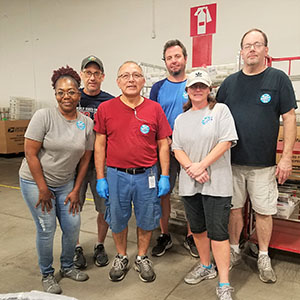 On the third day (Sept. 26) management presented their overview on the finances of the Postal Service as they try to justify their regressive proposals such as more non-career employees lower career pay scales and eliminating COLA and no lay-off protections.
On the third day (Sept. 26) management presented their overview on the finances of the Postal Service as they try to justify their regressive proposals such as more non-career employees lower career pay scales and eliminating COLA and no lay-off protections.
Seven more hearing dates are scheduled in the month of October during which the union will present their economic arguments for good wages protection of COLA and improved job security.
Stay union strong and union proud! Wear stickers union gear and wristbands to show management the APWU is united in our fight for a Good Contract NOW!
Email nccc@apwu.org if you would like more stickers and wristbands
Sign up for Contract Updates
Get Interest Arbitration news by email and text message

